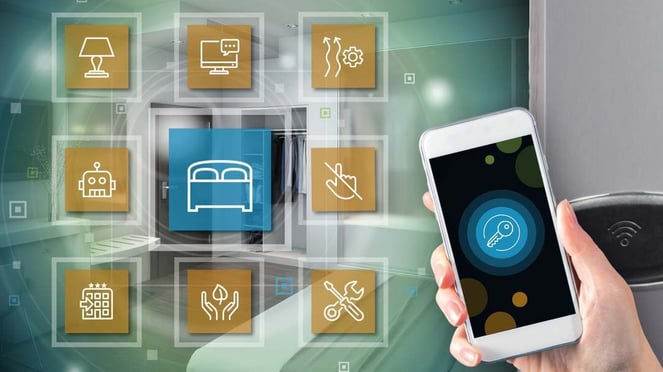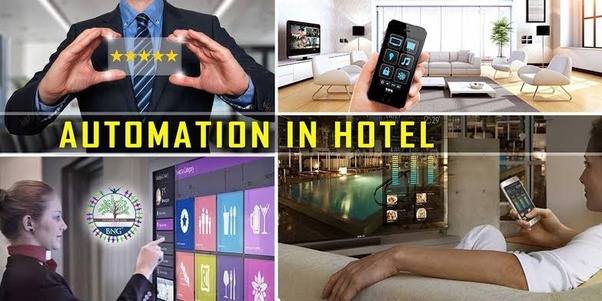.webp)

The hospitality industry has always recognized the importance of technology in delivering exceptional guest experiences and improving operational efficiency. Despite budget constraints, many hotels are increasing their investments in IT to stay ahead of changing consumer expectations.
In this blog post, we will explore six exciting technology trends that are poised to transform the hospitality sector and create new opportunities for hotels and other hospitality locations.
Service Automation: Enhancing Guest Experiences and Efficiency

Service automation is revolutionizing the way hotels interact with guests. From automatic check-in using mobile apps to facial recognition for unlocking guest room doors, automation is streamlining customer-centric activities. Artificial intelligence (AI) is also playing a significant role in service automation by acting as a concierge service, learning guest preferences and providing personalized experiences.
Imagine a hotel room where the thermostat adjusts automatically to the guest's preferred temperature or a martini waiting at the bar made with the guest's favorite gin.
While automation can improve efficiency, it is crucial to strike a balance and ensure that human interaction remains an integral part of the guest experience.
Fixed Mobile Convergence: Transforming the In-Room Phone

The in-room phone has traditionally been one of the least advanced technologies in a hotel. However, fixed mobile convergence is changing that. Hotels are now exploring ways to integrate mobile phones with in-room systems, allowing guests to switch between devices for calls, order room service, adjust lighting, and access in-room entertainment menus from anywhere.
Mobile devices can also be used to notify guests about packages at the front desk, remind them of appointments, and provide recommendations for local activities and events.
By transforming the in-room phone into a multi-functional device, hotels can cater to the needs of modern travelers who seek efficient and personalized services.
Location-Based Services: Enhancing Guest Engagement and Operational Efficiency

Location-based services are revolutionizing how hotels engage with guests and streamline operations. By knowing the location of guests within the property, hotels can improve marketing efforts by pushing personalized offers and notifications to their mobile devices.
Greeting guests at their room doors with a bottle of water or quickly responding to guest requests based on their location can significantly enhance the guest experience.
Location-based services also help hotels track the whereabouts of their staff, enabling them to respond to guest needs more efficiently.
For example, if a guest requests a toothbrush, the hotel can quickly identify the nearest staff member and fulfill the request promptly.
Connected Meeting Rooms: Empowering Business Travelers
Business travel is on the rise, with many travelers combining work and leisure activities. Hotels must cater to the needs of "workcationers" and "bleisure travelers" by providing the necessary technologies to help them be productive.
Connected meeting rooms are becoming increasingly important, offering videoconferencing capabilities, projection units, and smart whiteboards. These technologies can be extended to guest rooms, allowing travelers to conduct instant video meetings or access work-related services conveniently.
By providing a seamless and productive work environment, hotels can attract and retain business travelers who require more than just basic amenities.
Chatbots and Mobile Apps: Enhancing Guest Loyalty and Convenience

Mobile apps and chatbots are transforming the way hotels interact with guests and drive loyalty.
Mobile apps offer a range of services, from mobile check-in and room selection to controlling room amenities and accessing personalized recommendations. They also serve as loyalty programs, allowing guests to earn rewards and receive personalized offers.
Furthermore, chatbots leverage AI and predictive analytics to provide personalized customer service, making recommendations based on past stays and assisting guests with various tasks.
These technologies not only enhance guest convenience but also enable hotels to gather valuable data for personalized marketing efforts.
Building the Right Network Infrastructure

To leverage these technology trends effectively, hotels must ensure they have the right network infrastructure in place. Bandwidth demands will increase as more devices and services rely on the network.
Hotels should consider a combination of on-premises, cloud, and networking technologies like SD-WAN and high-speed broadband to handle the traffic efficiently. Additionally, managed services can be utilized to ease the burden on the current network and provide specific services without impacting performance.
Working with a network service provider can help hotels build and maintain a robust network capable of meeting the bandwidth-intensive needs of modern technologies.
In conclusion, technology trends are reshaping the hospitality sector, offering exciting opportunities to enhance guest experiences and improve operational efficiency. Service automation, fixed mobile convergence, location-based services, connected meeting rooms, and mobile apps with chatbot capabilities are transforming the way hotels interact with guests.
By embracing these trends and building the right network infrastructure, hotels can stay ahead of the competition and deliver exceptional experiences to their guests.
For more information and insights on these technology trends, please stay tuned with Thirty Sleeps, your trusted provider of long-stay hotels and serviced apartments in Dubai.
If you need guidance or assistance with finding the perfect accommodation that ticks all your boxes, simply contact us on Tap Here and Write in WhatsApp 📲📲📲 to make use of our concierge services.